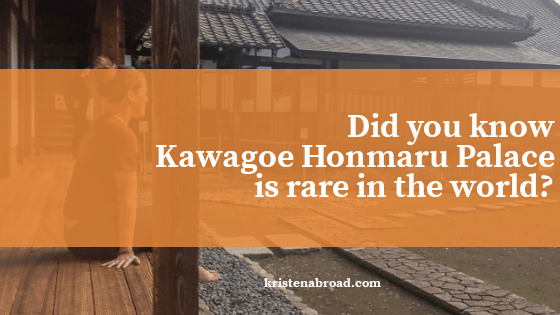A quick hour ride on the train from Tokyo will take you to Kawagoe (川越), also known as 小江戸 “koedo” or “little edo” in Saitama Prefecture. It’s main street of clay-walled buildings reminiscent of the Edo period of Japan aren’t the only thing this castle town has going for it. Kawagoe castle (川越城) is long gone so how about visiting a palace? The 川越本丸御殿 (Kawagoe Honmaru Palace, or goten is the Japanese word, inner citadel palace) is a rarity. One of the few Japanese palaces remaining.

Where did the castle go?
Constructed in 1450’s, so where did it go? There’s literally nothing of it left. No gates, no walls, no anything but a few mounds and what was once a small section of the moat. Yes, they even filled the moat. Only Kawagoe Honmaru Palace remains.
Why isn’t anything else here? Because when the Meiji era rolled around, they dismantled most of the castles. Best way to get your government going? Destroy the old one’s symbols. They ripped it down in 1870. You thought the fact that there are only 12 original castles left was spectacular? Palaces had an even harder go. The palace was also mostly dismantled. What remains of the oldest building in Kawagoe is about 1/6th
Kawagoe Honmaru Palace
The palace itself (what remains) was build in 1848 as a fire took it out two years prior. This makes Kawagoe Honmaru Palace the oldest building in Kawagoe. This served as the dwellings and offices of the Lord. Your visit will take you on a loop through the property.

Disclosure: Kristenabroad.com is a participant in the Amazon Services LLC Associates Program and other affiliate programs. For some links to products or services in this article, I may earn a small commission by you using my link. The price for you is not affected.
Even though none of the Castle remains, Kawagoe Honmaru palace is included on the list of 100 finest castles of Japan, coming in at number 19. Don’t forget your stamp!
Tatami Mats
One of my favorite things of the house I use to live in was the tatami mats in my “Japanese room”. Most houses are westernized nowadays but you do find some that are fully Japanese or at least that have one room that is still in the traditional style. The Palace shows you what it was like to have ALL tatami. You’ll be taking your shoes off in this one.
The Palace was recently renovated in 2011 so all of the mats are new.

Take a rest and gaze at the gardens
On the palace grounds there is a beautiful garden to gaze out at from engawa (縁側). Engawa is the word for the wood floor between where the storm shutters and shoji (障子, paper sliding walls) exist.

Don’t get scared by the mannequins
In one of the back rooms, there are three mannequins that are set up like they are discussing war plans. They’re chilling out, sitting seiza, 正座, which, side note, literally means “correct seat” which I think is hilarious. (Seiza is where you sit back kneeling with the tops of your feet flat on the floor).
If you don’t expect them though, you’ll jump a few feet like I did!

The Main Hall
You’ll finish out the route through with the main hall. Admire the size of the main hall and the fusuma (襖, sliding paneled walls that allow for shapes of rooms to change).
Admission
They are open from 9 to 5 and with an admission fee of 100 yen to get in, you can’t miss it.
Getting here
After you get to Kawagoe Station on, the town is VERY walkable with everything being in about a 1-2 mile radius. From the Warehouse District, it’s about a 10
Nearby Attractions
There’s definitely a days worth of attractions to keep you busy in Kawagoe. Here are some of the highlights:
- 蔵造りの町並み, Kurazukari no
machinami , the warehouse district. Keeping it’s Edo style roots there are lots of shops with souvenirs and food for you to try. - 時の鐘, Toki no
kane , Bell of time. This clock tower is considered one of the 100 Sound Sceneries of Japan. We have a thing with “100” this or that in Japan. - Kawagoe Festival Museum. One of my favorite parts of big festival towns, if you can’t make the real deal, you can at least learn about it at the museum!
- Hikawa Shrine, where the Kawagoe Festival
is centered around in October, is lovely year– round. Don’t think that’s the only time they have festivals though. There is also the wind chime festival in the Summer.
Pin this for later.

